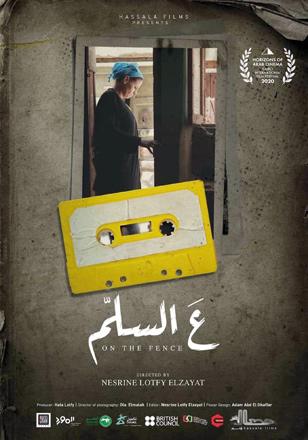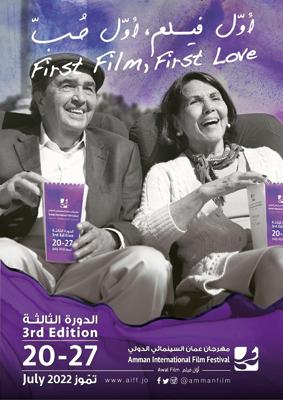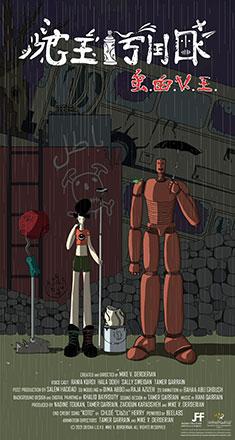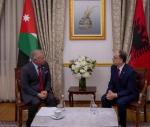You are here
Stories of displacement, trauma and resilience come to life at Amman Int’l Film Festival
By Hanna Davis - Aug 26,2021 - Last updated at Aug 26,2021

The film poster of ‘On The Fence’ directed by Nesrine El Zayat (Image courtesy of Nesrine El Zayat )
AMMAN — This year’s Amman International Film Festival (AIFF) sheds light on stories of hope and resilience and brings attention to complex social issues.
The festival, taking place this week, features 51 films from 26 countries, including seven Arab narratives and seven Arab documentaries, according to an AIFF statement sent to The Jordan Times.
HRH Princess Rym Ali, the festival’s president, highlighted that the festival aims to: “Develop and promote an Arab cinema that reflects the creativity of the region and tackles the issues that are prevalent today,” according to the AIFF website.
The stories bring to focus not just critical issues, but also share with viewers the richness and diversity of cultures and communities throughout the Arab region.
Nesrine El Zayat, in her film “On The Fence,” searches for her identity amidst the different societal expectations for women in Egypt. For eight years, Zayat filmed the transition between her life in her “more traditional” hometown, Tema in Upper Egypt, and Cairo.
Zayat explores her internal tension between “the two different cultures in which I lived,” where she defies the norms of one to fit into another. She said that she wants to share her story “from a small point on the map in Egypt, which a few people know about”.
Zayat’s film will be shown on Friday at 5:30pm and Saturday at 10pm, at Taj Cinema.
In the cross-border film “Only the Ocean Between Us”, four women connect with each other through film-diaries, sharing their stories of displacement, motherhood, and abounding power and resilience.
The Syrian directors Khaldiya Amer Ali and Marah Mohammad Al Khateeb share their lives in Za’atari refugee camp with the indigenous Shipibo directors, Karoli Bautista Pizarro and Christy Cauper Silvano in Lima, Peru.
“When we first started together, I got very excited because for the first time I was filming with a group of four young women, young mothers living in similar circumstances and I thought, what a coincidence!” Khateeb told The Jordan Times in an e-mail interview.
“Despite the fact we are in two different parts of the world,” said Ali, “the thing that connects us is that we are living in an area different from our country of origin, and that we are strong young mothers and women who have ambitions and strive to reach them.”
The directors formed a strong friendship, despite cultural differences and any pre-conceived notions.
The women broke stereotypes and overcame social pressures and fears. Silvano explained how, “making this film I overcame my fear of expressing myself as an Indigenous Shipibo woman”.
“Many people told us that when we became mothers we couldn’t do anything anymore,” Silvano said.
“This motivated us to work together to change society’s stereotypes about us,” she added.
“We figured out how to be filmmakers while also being mothers, which is really difficult,” Pizarro said.
Ali said that she would love, “the world to see the strength of the refugee woman… A refugee who lived under bombing and destruction and lost people dear to her, and despite that, she is a successful woman, mother and wife”.
“Only the Ocean Between Us” will be shown on Thursday at 5:30pm at Taj Cinema and Saturday at 9pm the Boulevard drive-in theatre.
In another documentary, “The Fifth Story”, which premiered at the festival, Ahmed Abd depicts the shared trauma, oppression — and strength — of the Iraqi people. Abd began his film in 2016, influenced by his childhood in Iraq.
Abd was only 11 when the civil war began. “It was a period of craziness, madness… You don’t know who’s is going to kill you, or what for. This transformed the kids growing up this atmosphere,” Abd told The Jordan Times on Tuesday.
Despite ongoing warfare, Abd said that, “the war made very strong people, who are capable of facing the hardest situations and challenges”.
He hopes his film will change the image of Iraqi people from “people of war and fighting” to “people who have ambitions, strength and look forward to creating a new future of peace”.
Related Articles
AMMAN — This year’s return of the Amman International Film Festival (AIFF) will continue to highlight debut achievements in film from around
AMMAN — Filled with new possibilities and impressions, the Amman International Film Festival — Awal Film (AIFF) chooses “First Film, F
AMMAN — Tickets were released on Thursday for the Amman International Film Festival - Awal Film (AIFF), which will take place between August



















